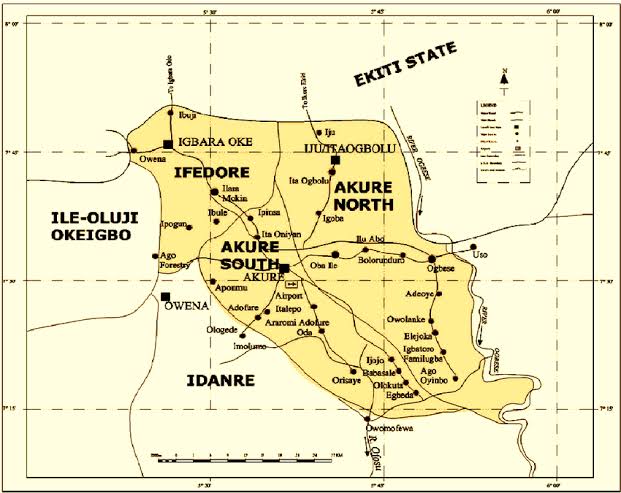By TEMITAYO AJILA
I write this appeal from the depths of my heart to the Deji of Akure, Oba Aladelusi Ogunlade Aladetoyinbo, Odundun II; the Iwarafa Mefa; and all sons and daughters of Akure, including many distinguished Nigerians. I plead for understanding and unity among all communities of the Akure District – Akure, Isolo, Isinkan, Oba-Ile, Ita-Ogbolu, Ilara-Mokin, Igbara-Oke, Ijare, and others, with particular attention to the three autonomous communities at the heart of the state capital: Akure, Isolo, and Isinkan.
This appeal is necessary because discord and conflict benefit no one. The persistent tension, especially between Akure and its immediate neighbours, Isolo and Isinkan, must end. We, the sons and daughters of the affected communities, are disheartened and exhausted.
I will not rehearse well-known history here. However, it is important to state that no amount of historical revisionism or legal maneuvering can erase the legitimacy and identity of these autonomous communities. As Chief James Ibori once said, land is as vital to a man as it is to a tree. Therefore, attempts to dominate others within the Akure District, particularly Isolo and Isinkan, will only deepen discontent and unrest. This tension undermines the collective peace and development of Ondo State, especially when unity is critical for supporting any government focused on stability.
It is painful to observe that since the creation of Ondo State in 1976, no Akure-born indigene has governed the state through a democratic process. The singular exception is Navy Commodore Michael Bamidele Otiko, appointed Military Governor during Buhari’s military regime. This history strengthens the call for an “Akure Agenda,” yet unity must precede that ambition. A fragmented Akure District cannot successfully produce a governor.
Regrettably, the dominant posture of Akure township in its dealings with other towns has led to resentment and withdrawal. When neighbouring communities begin to disassociate themselves from the District and even claim affiliation with Ekiti, it is because of the fear of marginalization, especially when their royal status is questioned or diminished.
It is unacceptable that a collective legal victory, such as the recent boundary ruling against Idanre, is being misrepresented as exclusive to Akure township. This judgment was pursued and funded by Akure District, and its benefits should extend to all communities—Isinkan, Igbara-Oke, Ala Elefosan, and others—who share boundaries with Idanre. It should not grant Akure township exclusive prescribing authority over traditional rulership or land ownership in these areas.
The Akure District is historically one entity, now administratively divided into Akure South, Akure North, and Ifedore. The judgement, therefore, is a victory for all, not just one. Attempts to monopolize such victories will only fuel further conflict.
The truth remains that in Ondo State, only the Governor has prescribing authority over traditional institutions. The idea that courts or traditional rulers can override this constitutional role is a fallacy. It is the Governor who recognizes, upgrades, or installs Obas, as affirmed multiple times across administrations. The belief that a change in government will reverse this is a dangerous delusion.
Some argue that Governor Agagu’s recognition of the Iralepo of Isinkan and the Osolo of Isolo was illegitimate. This is false. Governor Agagu, elected under the Nigerian Constitution, exercised his legal powers. His decisions remain valid unless overturned by due process, which they have not been. The separation of powers in Nigeria’s democracy ensures that executive decisions stand unless lawfully and duly nullified. Subsequent administrations under Governors Mimiko, Akeredolu, and now Aiyedatiwa have reaffirmed and implemented these decisions, culminating in gazetted statuses for various Obas across the state.
Therefore, no matter how many court rulings may be sought or obtained to challenge these recognitions, they remain largely academic once the White Paper implementing the Ajama Commission of Enquiry is in force and gazetted.
This is why the office of the Deji of Akure should not be drawn into disputes that risk disrepute. If peace and unity matter, the Deji must refrain from actions that challenge the authority of the state government or undermine recognized traditional rulers. The government has made its position clear: every community in Ondo State is autonomous, and no Oba can infringe on another’s domain.
A practical example of peaceful coexistence can be found in Abeokuta, the capital of Ogun State, where multiple paramount rulers coexist within one metropolis; Olowu of Owu, Agura of Gbagura, and Oshinle of Oke-Ona – with Alake of Egba Land as their permanent chairman. Despite differences in land mass and royal capacities, they operate peacefully. Why can’t Akure District do the same?
It must be reiterated that Akure District is not synonymous with Akure township. Naming the district after Akure town does not make it the exclusive authority. Just as Ondo town gave its name to Ondo State without the Osemawe claiming supremacy over all others, Akure township must show similar restraint.
This appeal should not be misread as an attack. Rather, it is a plea for peace, stability, and mutual respect. Governor Aiyedatiwa, having been part of past administrations that pursued peace and justice, will not undo the gains of unity. No blackmail or pressure will sway him from this path.
If the quest for an Akure Governor is sincere, let it begin with harmony and accommodation, not with strife and division.
*Ajila is a concerned son of Akure.
Do you want to share a story with us? Do you want to advertise with us? Do you need publicity for a product, service, or event? Contact us on WhatsApp +2348183319097 Email: platformtimes@gmail.com
We are committed to impactful investigative journalism for human interest and social justice. Your donation will help us tell more stories. Kindly donate any amount HERE




